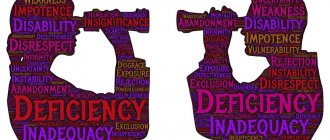IV. First impression effect
We all know about the effect of the first impression, which is formed in the first 7 seconds of acquaintance. You just opened the door, entered the office, and your interlocutor already has a certain idea about you. Which? But this is completely up to you.
Therefore, when preparing for an interview, you must:
a) create a winning mood - “I’m happy with myself, I’m happy with life, I have everything I need, I’m open to the world and positively perceive any of its manifestations (including the HR manager with whom I have to communicate!)...” . How to do it? Before entering the office, remember something very good, pleasant for you and keep this image in your mind during the conversation;
b) dress in the style accepted in the company (for this it is useful to conduct preliminary reconnaissance and learn more about the possible employer). At the same time, you need to feel natural and comfortable - clothes should be comfortable and not “just from the store.”
The most common standard interview questions
Here are a few questions that are asked in almost every interview:
- Why are you in a situation that forces you to look for a new place? State the reasons for dismissal.
- Why did you choose this profession and what do you like and dislike about it? What mistakes and achievements have you had before?
- Your positive and negative traits.
- Why should they hire you, how will you be useful in the new place?
- Your growth prospects or where you see yourself over time.
When going for an interview, advice from a psychologist will not be superfluous.
Psychologist's advice
Psychologists can give a 100% guarantee that they will not hire you if:
- You will curse previous employers.
- Talk sluggishly and indifferently about your work.
- Be hysterical, talking about your mistakes, showing complete confusion, unwillingness and inability to cope with the situation.
- Play smart or get off with standard phrases, not be interested in anything, passively agree with everything. You will not be interested in your future salary or responsibilities.
- Show that you don't value yourself.
When applying for a job, there are no small details; actively find out all the points that are interesting to you, so that in the future there will be no need to change your workplace due to some small detail, which in your case will be decisive.
V. One of the laws of interview ethics says: the director is the one who invited you to the interview.
Seizing the initiative is unacceptable here.
Now let's look at some aspects of the interview in more detail.
- It is advisable to arrive for the interview a little earlier than the appointed time - this will give you the opportunity to assess the situation, hear how employees communicate, etc.
- Just as different directors shoot melodramas, comedies, epics, and thrillers, so there are different types of interviews. The type of interview depends on the specifics of the job ahead of the candidate, as well as on the personality of the recruiter himself.
There is, for example, a so-called “stress interview” - an attempt to unbalance a person. It is usually carried out if the position is associated with numerous stressful situations. Let's say you were kept waiting for a long time in the reception area. Please note that this is most likely not an accident, but a test of your patience and level of stress resistance.
- From the very beginning of the conversation, be able to hear the question and answer specifically. In some companies, for example, they may ask you: “Would you like something to drink - tea, coffee?” Here you need to answer: “Thank you, yes” or “Thank you, no.” If the question is: “Would you like tea or coffee?” - you have to choose. Keep in mind, this is also a test.
- Any questions can be asked during the interview. We must be prepared for this and, I remind you, always speak kindly and confidently!
- It is important not only how, but also what you say. When talking about yourself, use active verbs: “I can”, “I own”, “I work”...
Speech is an indicator of intelligence: “He who thinks clearly, expresses clearly.” At the interview, the applicant's vocabulary, intellectual and cultural level are assessed. So avoid “type” slang and all sorts of “as if” parasites. Professional jargon is appropriate only as an inclusion, unobtrusively demonstrating your competence.
- During the latest Russian population census, an interesting fact was discovered: it turns out that there are much more married women in our country than married men. But the fact is that couples living in a civil marriage have different attitudes towards their marital status. Women think they are married, and men think they are single. In this regard, you need to clearly understand that at an interview, when asked: “What is your marital status?” - you should answer: “Married” or “Married” only if your marriage is officially registered.
- If you have small children, pay attention to the following effective candidate responses to recruiter questions on this topic:
- Do you have any children?
- Yes.
- How many?
- Two.
- How old are they?
- Two and five.
- Will this interfere with work?
- I thought about this question and solved it.
- When it comes to your previous job and why you left, the main rule is: only good things about the past, like about a dead person. No aggression, no negativity: “There was no opportunity for career growth, but I gained useful experience and remained on good terms with colleagues,” etc.
- The question of your strengths and weaknesses is often confusing. A little hint. It’s quite ethical to start a conversation about strengths like this: “Colleagues (or friends) say that I…” Next, focus on professional skills, learning ability and positive characteristics more related to work, such as responsibility, determination, initiative. Naturally, do not forget about specific examples.
As for the “minuses,” they should be presented in such a way that it sounds like a “plus”: “No work experience, but there is great interest...” In this context, a joke that can be rehearsed in advance also works well. Good improvisation, as you know, is always the result of serious preparation.
- A harmoniously developed person knows how to both work and relax. Therefore, when you are asked how you spend your free time or asked to talk about your hobby, you need to talk about your hobbies with enthusiasm and always with knowledge of the matter.
- In the last part of the interview, the recruiter usually asks the candidate: “What questions do you have?” And based on the content of the latter, it evaluates the quality of your motivation. Here are examples of the correct topics covered by the candidate in their questions:
- work specifics;
- delegation of authority;
- What was good about my predecessor?
- What kind of person in this position would be effective for you?
- We are left with one, perhaps the most important, and sometimes decisive aspect of the interview - future salary. What you should definitely do is pre-market similar items!
a) As a rule, the salary is called by the HR manager himself. If it is small, it is appropriate to ask: “What is your compensation package?”
b) Sometimes they find out from the candidate what kind of money he would like to receive. In this case, name an adequate number and pause. Whoever opened his mouth first lost.
c) If suddenly the question of salary was not raised at all, you have the right to ask it yourself. I will only note that it is psychologically beneficial to ask in this way: “What salary is customary to pay in this position - calmly, kindly!
- At the end of the conversation, you should thank you for your time. Moreover, according to the ethics of business communication, if they spent more than 20 minutes on you, it is proper to write a routine thank-you letter.
- Don't condemn yourself to the agony of waiting for a long time for an answer. It is entirely within your power to reduce it to a maximum of one week. After saying goodbye, ask: “When can I find out about the results: at the beginning or at the end of the week, when should I call?”
Behavior
An interview is a negotiation about potential cooperation. Regardless of the field and place of employment, you need to remember the general ethical and psychological rules:
- Eliminate the physiological manifestations of fear and stress: do push-ups, eat candy, go for a run. But don't do it right in front of the office.
- When you come to the office, be polite and friendly to everyone. Perhaps you will meet future colleagues or superiors. Be careful, do not allow liberties and personal conversations on the phone (describing the place you came to in a bad light, or loudly discussing personal problems).
- Turn off your phone.
- In all forms and documents that you are asked to fill out, write only truthful information. But at the same time, remember about safety, carefully read the papers you fill out.
- When you enter the interview room, introduce yourself and ask for the name of the person you are talking to. Ask where you can sit or wait to be offered one.
- When communicating, maintain eye contact and address the other person by name.
- Try to remember the names of all the people you meet the first time. The handshake should be firm, but not too strong.
- Watch your posture. Take a confident but relaxed position: don't lean back, but don't lean forward either.
- Watch the non-verbal speech of your interlocutor and adapt to it. Avoid excessive gestures yourself, do not be afraid to take pauses to select words and more accurately express your thoughts.
- Do not interrupt your interlocutor, listen carefully, answer only to the point.
- If you are not sure that you understood the question correctly, ask again (“Did I understand correctly that...?”).
- Be objective and emotionally restrained, avoid excessive frankness.
- Don't try to present yourself in an ideal image; be honest about your shortcomings or unpleasant facts from your biography that need to be said. But immediately restore the balance by listing the advantages and positive characteristics.
- Watch the wording. For example, instead of “I was on maternity leave for a long time,” you can say “while I was on maternity leave, I managed to take such and such courses, learn such and such, read such and such literature.” Instead of “I’m unemployed,” say “I’m freelancing” or “temporarily unemployed,” if that’s the case, of course.
- Avoid defiant and dominant behavior, but also do not forget about self-esteem. Even if you really need a job, don’t push for pity, don’t talk about your plight. It is better to list positive professional characteristics.
- Ask a minimum of questions. Ask only about the essence and work. Don't start with asking about salary. Be interested in the content of the work and the conditions for its successful implementation.
- Remember that the employer is primarily interested in your professionalism. Try to demonstrate professional skills and qualities.
- At the end of the conversation, ask how you can find out about the results. Can you call yourself? Thank you for the interview.
If you have the opportunity to ask questions, you can ask about the following: what goals the company currently sets, and how you can help achieve them; what should be the ideal candidate for the position in question; What advice will an employer give to a new employee?
Sources
- Blazin LJ., Terao MA., Spraker-Perlman H., Baker JN., McLaughlin Crabtree V., Mandrell BN., Gattuso J., Sellers J., Dunn TJ., Lu Z., Hoffman JM., Burlison JD. Never Enough Time: Mixed Methods Study Identifies Drivers of Temporal Demand That Contribute to Burnout Among Physicians Who Care for Pediatric Hematology-Oncology Patients. // JCO Oncol Pract - 2021 - Vol - NNULL - p.OP2000754; PMID:33720755
- Pelleg AR., Schiller G., Goldhirsch SL., Fernandez HM., Lindenberger EC. Geriatrics and palliative medicine leadership is needed now more than ever: What are the training gaps? // J Am Geriatr Soc - 2021 - Vol69 - N4 - p.1063-1070; PMID:33580716
- Smith M.J., Sherwood K., Ross B., Smith JD., DaWalt L., Bishop L., Humm L., Elkins J., Steacy C. Virtual interview training for autistic transition age youth: A randomized controlled feasibility and effectiveness trial. // Autism - 2021 - Vol - NNULL - p.1362361321989928; PMID:33567883
- Zamanzadeh V., Ghahramanian A., Valizadeh L., Bagheriyeh F., Lynagh M. A scoping review of admission criteria and selection methods in nursing education. // BMC Nurs - 2021 - Vol19 - N1 - p.121; PMID:33317532
- Toth-Pal E., Fridén C., Asenjo ST., Olsson CB. Home visits as an interprofessional learning activity for students in primary healthcare. // Prim Health Care Res Dev - 2021 - Vol21 - NNULL - p.e59; PMID:33298216
- Luo AJ., Xu ZH., Cai PP., He HY., Mao P., Xie WZ. Qualitative Study on the Influencing Factors and Countermeasures Against Job Burnout Among Organ Donation Coordinators. // Front Public Health - 2020 - Vol8 - NNULL - p.571514; PMID:33194972
- Vaingankar JA., Teh WL., Roystonn K., Goh J., Zhang YJ., Satghare P., Shahwan S., Chong SA., Verma S., Tan ZL., Tay B., Maniam Y., Subramaniam M Roles, Facilitators and Challenges of Employment Support Specialists Assisting Young People with Mental Health Conditions. // J Occup Rehabil - 2021 - Vol - NNULL - p.; PMID:33090356
- Lartey JKS., Osafo J., Andoh-Arthur J., Asante KO. Emotional experiences and coping strategies of nursing and midwifery practitioners in Ghana: a qualitative study. // BMC Nurs - 2021 - Vol19 - NNULL - p.92; PMID:33041657
- Selvam R., Hu R., Musselman R., Raiche I., Moloo H. Video-based interviewing in medicine: protocol for a scoping review. // Syst Rev - 2021 - Vol9 - N1 - p.219; PMID:32977852
- Dekker A.E., Kleiss I., Batra N., Seghers M., Schipper IB., Ring D., Claborn K. Patient and clinician incentives and barriers for opioid use for musculoskeletal disorders a qualitative study on opioid use in musculoskeletal setting. // J Orthop - 2021 - Vol22 - NNULL - p.184-189; PMID:32419762
Examples
Luscher diagnostics
Color testing or Luscher test . This is one of the easiest ways to get to know a person. For a psychologist, its results are a little deeper than for a person without a medical education, to whom this test will seem similar to the “tests” from glossy magazines.
The essence of the test is that several colored cards . There are eight of them, each with its own color: red, yellow, green, blue, purple, brown, gray and black.
The candidate is asked to arrange the cards by color, starting from the one that is most pleasant for him personally . The results obtained are recorded, the cards are mixed and again they are asked to do the same. Based on what colors a person chooses for his sequence, a conclusion is drawn about his qualities and stability in stressful situations .
Psychological diagnostics using the Luscher test and advice from a psychologist in this video:
Rorschach test
This testing is known even to those who have never encountered psychology.
Thanks to many films (mostly foreign), one could see how a psychologist in glasses shows pictures with blurry blots to his clients.
The essence of the method is that the applicant is shown a dozen pictures depicting blots.
They can be color or monochrome (black and white). The person is asked to tell what he sees in these images .
By listening to the answers, the specialist will understand whether the person has mental disorders of mentality and way of thinking he has .
Rosenzweig method
This test is not as famous as the previous two, but is no less effective in determining certain personality traits. It consists of twenty-four pictures. They depict people in stressful situations .
For example, two people are standing by a car, and a departing train is visible in the background. Both have squares that already contain several phrases. Thanks to these phrases you can understand what happened in the picture.
In the example about the car, one person tells another that he is very sorry that because his car broke down, they were late for the train. In the second square you are asked to enter your own version of behavior or phrases in this situation. Thanks to such pictures, you can evaluate a person’s behavior when he fails .
You can find out how testing is carried out using the Rosenzweig method by watching the video:
Markert method
This test can be called the fastest. It can even be done at home on your own . This test has the most variable and short-lived results. Plus, they can change depending on your mood.
The bottom line is that the candidate is asked to choose two from eight symbols of different shapes : the one he likes most and its opposite. The symbols look like strokes made with a thick marker. In the subconscious they are associated with a person’s movement or posture. Depending on which “stroke” the candidate chooses first, the psychologist draws a conclusion about how he would like to move now or which posture is preferable. The same with the second symbol - the most undesirable pose is determined. It is important to remember that the result refers to a given point in time .
Personality questionnaires
Questionnaires are a kind of questionnaire with questions or statements.
By answering them or choosing one of several, a person secretly communicates some information about himself. Questionnaires can be of different directions .
When hiring, psychologists focus on those that determine the most significant character traits, a person’s motivation, and his opinion .
When a psychologist receives the task of establishing any of these points in candidates, he compiles a corresponding list of questions or statements.
So, what should a job seeker be prepared for?
- Waiting
Long waits are used by employers to see how you will behave and what you will do while you wait for the interview to begin. As a rule, the interview is “delayed” for 30-60 minutes. And sometimes longer. It happens that the employer, on the contrary, “postpones” the interview time to an earlier date and asks you to arrive earlier. The purpose of such manipulations is not to pull the rug out from under your feet, but to test your flexibility and stress resistance. - Setting:
You were not offered to take off your outerwear? Is the chair wobbly? Is the room too loud? The recruiter is waiting for 5 more candidates for the same vacancy? Is the interview being held on the landing because all the meeting rooms are occupied? It is likely that the employer intentionally created such conditions. Try to remember the “correct” answer in such a situation. - Projection
Is the conversation on general topics and you can safely share your valuable opinion? Don't flatter yourself! This is where the trap lies. Your interlocutor projects everything you say onto you. Therefore, answer all questions about other people (“What do people like about work?”, “Why might a person quit?”) answer with special care and tact. - Provocation
Unlike projection, provocation is a “frontal attack on the interview.” There will be no beating around the bush here. Direct, tough and often simply unpleasant questions will definitely not leave you indifferent (“What’s wrong with you if you were fired?”, “What are you sick with?”, “I was already wow at your age!”). So take a breath and don’t be fooled! Otherwise, the appearance is failed.
Qualities Employers Look for in Ideal Candidates
- Decision making ability
Today's labor market requires people who are able to quickly assess the situation and make the right decision. To ensure the smooth operation of the organization, it is important for the employer that not only managers, but also ordinary employees possess this quality.
A situation where an employee is not able to quickly make a decision on the spot when it is required of him can cost the company dearly, both in terms of financial losses and loss of brand image.
To avoid such a situation, the head of the organization will give preference to people who are able to quickly make the right decisions under the pressure of various circumstances.
- Problem solving ability
It is assumed that various problems may arise in the workplace, one way or another. These could be operational inconsistencies, sales problems or conflicts between employees. Be that as it may, management expects that one of the employees will offer a worthy solution.
Having people who can solve any problem that arises in the company is what every employer desires. If they are present, the success of the company is guaranteed.
- Possess effective communication skills
Performing duties in any workplace requires the employee to be able to interact with a variety of people: colleagues, management, clients, suppliers, auditors and officials.
Therefore, it is important for an employer to find people who are able to conduct competent dialogue, both orally and in writing.
For people applying for leadership positions, the ability to communicate effectively is a prerequisite.
- Receiving and processing information
With the development of information technology, it is extremely important for employers to hire people who can extract the necessary information from various sources, process it and deliver it to the right personnel for appropriate action.
Applicants must know how to use email and Microsoft Office to receive and process information.
- Planning skills
Any employee, whatever his responsibilities, must be able to draw up a work plan. Planning will help you get the job done in a timely manner.
The ability to plan helps reduce time and material losses and increases work efficiency.
Planning skills are especially important for managers at all levels, because... they ensure that projects are completed on time. The employer understands the impact of planning ability on an employee's productivity, so this is one of his main interests when recruiting for management positions.
- Organization skills
In order for the process to go smoothly, you need a good level of organization in the workplace,
It is important for workers to be able to keep their workplace in order with the correct and convenient arrangement of all the necessary parts and elements.
They may also need to keep records of deliveries so that by a certain time they know the status of the supply of materials and bring it to the attention of the manager.
For a manager, his organizational skills will allow him to effectively plan ongoing work and meetings, monitor projects, distribute tasks and ensure the organization of employee work.
- Ability to prioritize tasks
Since middle-level managers usually have many urgent current responsibilities, an important task for them is setting priorities, i.e., determining the sequence of actions.
This means that you should make a list of the activities that you need to complete in order of importance and urgency of completing them.
The implementation of such a plan brings a sense of satisfaction to the manager and contributes to the growth of labor productivity of him personally and the organization as a whole.
The ability to prioritize responsibilities is useful not only for managers, but also for employees, as it increases the level of productivity, so this is the quality that employers look for when hiring.
When applying for a job, psychological tests must include tests for prioritizing work tasks.
- Ability to analyze quantitative data
The ability to analyze various data and present it correctly can help a company make effective decisions.
Employees in leadership positions who are successful in their jobs must have this skill. Companies typically generate a lot of different statistics and always require detailed understanding and interpretation so that management can make better decisions by understanding the trends.
Numerical tests are specifically designed to assess applicants' ability to analyze numerical data.
- Possession of technical knowledge
Some positions certainly require candidates to have some technical knowledge.
Before you apply for a job, you should know the employer's requirements to understand how your technical knowledge matches those requirements.
- Experience using computer programs
Most basic jobs, held by both employees and managers, require the use of computer programs to perform routine tasks and increase productivity.
There are different types of programs used to perform tasks and responsibilities in the workplace. Microsoft Office is especially popular in many offices around the world for a wide variety of administrative and business tasks.
Employers usually indicate in their job advertisements those programs that the applicant must have confidence in.
If you don't have the required software skills, you can gain them by interning in using such tools.
- Writing reports
Managers at all levels, sales and marketing managers and employees at any level of the company must be able to draw up a report and edit it efficiently in accordance with the requirements.
Typically, staff submit reports to management on a timely basis (weekly, monthly, quarterly and annually) detailing the activities of their departments, projects, etc. This helps management to properly evaluate the work done and identify tasks for the future.
- Opportunity to increase sales
Nowadays, it is extremely important for most companies to be able to increase sales. Such companies seek to hire people with strong marketing skills and the ability to influence others in purchasing decisions.
This quality is especially important for sales or marketing positions.
Therefore, you as an applicant need to have these skills to increase your chances of being selected.
How to overcome fear
Not everyone knows how to successfully and easily pass a job interview. Much depends on how a person behaves. If he stiffens up, sweats profusely and sits on the edge of his chair, he is unlikely to be hired.
The first sign of insecurity is slouching and drooping shoulders. Such a person seems to be afraid of a blow or aggression directed at him. He tries to become invisible and small. This is unacceptable behavior for a sales consultant.
Important! If you wish, you can eliminate any psychological problems, but this will take time. Constant training and work with a psychologist will help in this matter.
You can rehearse your gait at home, imagining yourself in different roles. You should talk to strangers more often on the street. All this will help you gain self-confidence.
The task of a sales manager is to convince customers. Therefore, he must speak clearly, competently and not lose composure in any situation. Developing this skill will require conversations with different people. This will help you overcome your fear of talking.
The potential candidate needs to go to more interviews. With their help, he will be able to try on different images, this will give him confidence. Gradually, fear will stop bothering him.
Stopping being afraid is not so easy. You can draw your anxiety on paper and then tear up the drawing. This technique will make it possible to get rid of internal experiences.
A salesperson often encounters different people in his work. They don't always behave correctly. Many potential candidates are afraid of being on the sales floor and facing rudeness. It is difficult to prepare for this, but it is possible. At home, it’s worth rehearsing different possible conflict scenes. Thinking through possible solutions allows you to take your mind off your worries.
If a person is to manage a department, then special personal qualities will be required from him.
Speaking English is a useful skill. If a person is afraid of being in an unfortunate position at an interview, then he can look for a person to talk to. Training will increase your self-confidence.
There are different tips for job applicants. They are given not only by HR people, but also by experienced psychologists. Don't neglect them, as this information can help.
Rarely does anyone get a job the first time, there is no need to worry about this - bad experience is also useful
Before going to an interview, you need to remember the experience of a successful interview. Restore it in memory in the smallest detail. The picture will inspire and give confidence.
Success at an interview may not come immediately. In case of refusal, a person should analyze his mistakes, think about them and not make them in the future. You can contact experienced HR people for advice.
How to properly discuss salary
Talking about money is always a sensitive topic, no matter where it is discussed. However, you need to think about these types of questions that will inevitably arise during testing. If they have not hinted to you that they are already hiring you, it is better not to talk about money at the first interview. Why? If you initiate such a conversation yourself (even though you have not been asked about it), it may leave an unpleasant impression on the interviewers, and some of the interviewers will simply assume that you only care about money. They may think that as soon as you find a “more convenient” place, you will certainly run there.
Often during the conversation they ask directly how much you would like (or not want) to receive. In this case, it is better to simply say that you are ready for a compromise and everything can be discussed. If the interlocutor insists and forces you to voice a specific figure, then write the industry average salary for the market, adding 10-20% on top for the opportunity to bargain a little. Or you can answer like this: “Let’s discuss the issue of salary later, when I become your employee. It seems to me that your company knows how to value specialists and pays them decent remuneration.”
Determining what amount you should name as a decent salary is not difficult. Go to a job search site and monitor salary statistics for your industry and skill level. In some situations, the question of monetary reward can be a kind of test of the ability to position oneself as a specialist.
The most interesting stage of the interview is when the conversation is almost over and the recruiter asks if you have any questions. If everything has been well explained and told to you, it is highly advisable to ask additional questions - this is an optional, but essential part of the research when assessing a candidate for a vacancy. In addition, this is an excellent opportunity to “switch roles”, clarify all the ambiguities yourself and get answers to the points that concern you.
So, in particular, when they tell you that they are definitely hiring, wait for the right moment to further clarify a few nuances:
- whether your insurance will pay for it;
- how salaries are paid (once every month or two, including advance);
- Is there a policy of cash bonuses or bonuses for exceeding planned indicators?
Depending on the responses of HR officers, one can draw conclusions about how much the company cares not only about monetary remuneration, but also about the health of its employees. If you are uncomfortable asking about this, then any questions related to the life of the company will definitely be appropriate. You can ask, for example, what goals the company sets for itself. If they answer you, this will help clarify how firmly the organization is standing and whether it is going to develop further.
It would be a good idea to clarify whether your responsibilities will be limited to the job description, what areas of responsibility your position involves, and with whom you will have to interact additionally. You can ask about approximate tasks that will be solved with your participation, how and when you can expect a promotion, and what ceiling you could achieve in your current position. Having found out the answer (depending on your goals: do you need career growth or not), decide whether you are on the path with this company or not.
Psychological techniques for interviews
When going for an interview, each of us would like to know in advance all the tricks and tricks that employers use and which are so often the reason for refusal of a job. Often these methods play a decisive role in the process of determining your suitability for the proposed position. Having mastered them, at least you will maintain decent self-control, confidence in your professionalism and your own capabilities.
1. If during an interview you are asked to draw a non-existent animal on a piece of paper, do not be surprised.
As my experience has shown, you have to draw often, especially if you get a job in foreign companies. This is not a joke for those coming for an interview, but just one of the so-called. graphic techniques widely used in psychology. So feel free to take a pencil and draw any animal that comes to your mind. No one will look at your artistic abilities and quality of workmanship. The only catch and trick is that this animal will... personify you, being your psychological portrait. So draw a shaggy, big-nosed, small or large creature, the main thing is that it turns out to be kind and endearing. Don't forget that this is your internal prototype!
2. Questions about your weaknesses and strengths may carry with them pitfalls and tricks.
When talking about your own merits, the main thing is not to overdo it in praising yourself and not to get sidetracked by qualities that are not relevant to this vacancy. We can talk about your responsibility, diligence, punctuality, initiative, decency, and ability to maintain efficiency in the most difficult work situations. But it is not at all necessary to mention your reliability and readiness to perform any work that employees may ask you to do. There is no need to talk about excessive kindness and frankness with people, and even more so there is no need to mention that you can cross-stitch perfectly, and the greatest hobby of your life is your dog. Disadvantages are more difficult to discover. You won’t admit that you really like to sleep in the morning, that sometimes you show signs of laziness, which often drags on for a couple of weeks, that sometimes you can put someone who is too intrusive in their place, and that you are completely unfriendly with your neighbors? In this case, before the interview, come up with a couple of insignificant shortcomings that can be interpreted in two ways, and when the opportunity arises, they can successfully turn into your invaluable qualities. For example, that you take your work too seriously and worry about the failures of others, that in conflicts you sometimes behave calmly and balanced, although sometimes you need to express yourself sharply and categorically, that you are too decent in our difficult times, where people who think only About Me.
3. Psychological pressure is often used during interviews.
Many of those interviewed would rather call it “psychological suppression.” And they will be right. The purpose of this method is to look at your behavior and find out whether you are aggressive, balanced, self-controlled and can behave adequately in complex, intractable and critical situations. Using this method, the interviewer will simply begin to “irritate you,” either repeating his questions several times, or appearing indifferent and indifferent, or interrupting you without allowing you to finish your sentence, or pausing too long, watching your reaction. Your goal in such a situation is to maintain composure and, if the situation requires it, repeat the answer to the question asked for the umpteenth time several times; ask sympathetically what exactly the interlocutor did not understand; being interrupted mid-sentence, let it pass without a hint of indignation and with a smile on your face and, finally, in long pauses, look questioningly into the eyes of your interlocutor, showing that you are ready to answer his further questions. The main thing is to maintain composure and confidence!
4. Your interlocutor may behave inappropriately.
This method is used to find out how you will behave in situations on the verge of conflict. Arrogance, self-confidence, and too provocative behavior of the interviewee can often simply infuriate you and, thus, clearly demonstrate to your interlocutor your behavior in such situations. As a rule, an applicant may have three reactions to the inappropriate behavior of the interviewer: a response (coldness, arrogance, aggressiveness), withdrawal (silence, indifference, a desire to end the conversation as soon as possible) and a reaction of uncertainty and nervousness. You should know that such behavior of the interlocutor does not always mean that he did not like you or that the position does not correspond to your professional skills. Often, this is just a method of testing your personal qualities in case of conflicts that arise in any team. In such a psychological testing situation, patience and self-control are appropriate.
5. Questions about future plans are a very subtle method of finding out your future intentions regarding working in a given organization.
I remember how my classmate almost received a prestigious position in the largest thriving company. And already leaving the interview, the head of the company, saying goodbye at the door, asked the successful young man if he wanted to go work abroad in the future. My classmate, having inadequately assessed the question asked, frankly and cordially admitted that at the first opportunity he would leave the country and build his career in the West. The next morning he received a call with a refusal. Talking about your desires and plans during an interview is commonplace. But the answers should not go beyond your desires to realize yourself, to demonstrate your most business qualities and abilities, to help the company become a strong competitor in the market - everything that will allow the employer to rely on you and be sure that you are looking for a job with long-term prospects, and serious plans are your main goal.
6. A person who is too frank and talkative does not make the best impression on the employer.
The interviewer may provoke you to be too frank. And even if you are in the mood for a purely business conversation about your professional qualities, incorrect questions or personal questions can confuse even the most confident person. A way out of this situation can be your response to a question about how this strange, in your opinion, interest in your private life can be related to your future work. Ask how important your answer is to getting a position in this company. In a word, be prepared for the fact that during the interview you will often have to get out: tactfully and with dignity.
7. Sometimes, after discussing all your professional qualities, the interlocutor will try to find out your views on abstract topics.
He may want to know your political or religious views or attitude towards the current situation in the country. Here, as when discussing personal topics, some caution and distance should be maintained. Ask again how this relates to the position you are receiving, and how your answers might describe you professionally. If the interlocutor still insists on receiving answers, limit yourself to general phrases about the instability of the economic and political situation in the world and make it clear that you are not yet a supporter of any one political party, and that you have a special, individual attitude towards religion, about which, To understand, you need to talk too long.
When going to an interview, you must believe that you will definitely be appreciated. Staying true to the same mindset - confidence and calm - is one of the main steps to your success. After all, in this case, there is every chance to give the impression of a self-valuing professional, a competent worker and a balanced person with self-esteem. And we should never forget that the interview process is just a conversation during which not only the employer, but also you have the right to ask questions and expect specific, comprehensive answers to them, which will later allow you to evaluate the activities of this company, its seriousness and stability and finally decide whether you should work here or if you deserve better.
Based on materials from Zontik.ru











